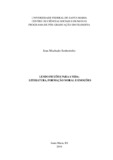| dc.creator | Senhorinho, Jean Machado | |
| dc.date.accessioned | 2019-02-22T15:42:32Z | |
| dc.date.available | 2019-02-22T15:42:32Z | |
| dc.date.issued | 2018-08-21 | |
| dc.identifier.uri | http://repositorio.ufsm.br/handle/1/15726 | |
| dc.description.abstract | This dissertation shows an investigation about how fictional literary works tout court can
morally form us. The goal is to constitute a defense to literature potential for our moral
formation. As starting point, the first chapter put forward an extensive reconstruction of John
Gibson’s position in Fiction and the Weave of Life (2007). In this process, this work adopts
Gibson’s treatments for two old philosophical deadlocks about literary art: the fictional one
and the cognitive valor one. Summarily, first, the author employs the second Wittgenstein’s
approach about language to clarify the direct connection between fictional texts and real
world. Second, he advances a neocognitivist thesis to claims literary cognitive value in terms
of “acknowledgement” and “understanding”, rather than “knowledge” and “true”. From
Gibson’s philosophical vocabulary, in the second chapter, this work creates the “Moral
Conceptuary Thesis” as an attempt to clarify how literature tout court can morally form us.
According to this thesis, literature can evaluatively reorient our moral concepts; for instance,
changing our moral understanding about life and our moral formation. Next, this work tests
that proposal against empirical skepticisms and idealistic excesses about literature’s prospect
for our moral education. The result of such consideration is a reservation about the current
indeterminacy of literature’s moral influence level, frequency, and conditions upon us. The
last chapter offers an additional qualification about the role of emotional engagement to
adequate understanding of moral concepts. In this regard, the intention is to imply that
emotions instigated for literature’s dramatic structure are crucial for morally oriented
conceptual assimilation. At the end, for sake of exemplification, this study also brings a
reading of Mary Wollstonecraft Shelley’s Frankenstein. This dissertation’s conclusion is that
literature tout court has great potential to form us morally, notwithstanding the absence of
reliable ways for the precision of such formative impact. | eng |
| dc.description.sponsorship | Coordenação de Aperfeiçoamento de Pessoal de Nível Superior - CAPES | por |
| dc.language | por | por |
| dc.publisher | Universidade Federal de Santa Maria | por |
| dc.rights | Attribution-NonCommercial-NoDerivatives 4.0 International | * |
| dc.rights.uri | http://creativecommons.org/licenses/by-nc-nd/4.0/ | * |
| dc.subject | Conceitos morais | por |
| dc.subject | Filosofia e literatura | por |
| dc.subject | Ficção | por |
| dc.subject | John Gibson | por |
| dc.subject | Neocognitivismo | por |
| dc.subject | Fiction | eng |
| dc.subject | Moral concepts | eng |
| dc.subject | Neocognitivism | eng |
| dc.subject | Philosophy and literature | eng |
| dc.title | Lendo ficções para a vida: literatura, formação moral e emoções | por |
| dc.title.alternative | Reading fictions for life: literature, moral formation and emotions | eng |
| dc.type | Dissertação | por |
| dc.description.resumo | Esta dissertação apresenta uma investigação sobre como obras literárias ficcionais tout court
podem nos formar moralmente. O objetivo é constituir uma defesa ao potencial da literatura
para a nossa formação moral. Como ponto de partida, o primeiro capítulo propõe uma
reconstrução extensiva da posição de John Gibson em Fiction and the Weave of Life (2007).
Nesse processo, o trabalho adota os tratamentos de Gibson para dois velhos impasses
filosóficos sobre a arte literária: o da ficção e o do valor cognitivo. Resumidamente, primeiro,
o autor emprega a abordagem do segundo Wittgenstein sobre a linguagem; a fim de esclarecer
a conexão direta entre os textos ficcionais e o mundo real. Segundo, ele avança uma tese
neocognitivista para reivindicar o valor cognitivo literário em termos de “reconhecimento” e
“entendimento”, em vez de “conhecimento” e “verdade”. A partir do vocabulário filosófico
provido por Gibson, no segundo capítulo, este trabalho cria a “Tese do Conceituário Moral”
como uma tentativa de esclarecer como a literatura tout court pode formar moralmente. De
acordo com a tese, a literatura pode reorientar valorativamente os nossos conceitos morais;
por conseguinte, mudando o nosso entendimento moral sobre a vida e a nossa formação moral.
Em seguida, este trabalho testa os limites dessa proposta frente a ceticismos empíricos e a
excessos idealistas sobre o prospecto da literatura para a nossa educação moral. O resultado
de tal consideração é uma ressalva de que o nível, a frequência, e as condições da influência
moral da literatura sobre nós não podem ser determinadas ainda. O último capítulo oferece
uma qualificação adicional sobre o papel do engajamento emocional para o entendimento
adequado de conceitos morais. A esse respeito, a intenção é indicar que as emoções instigadas
pela estrutura dramática da literatura são cruciais para a assimilação conceitual moralmente
orientada. Ao final, para fins de exemplificação, este estudo também traz uma leitura de
Frankenstein, de Mary Wollstonecraft Shelley. A conclusão desta dissertação é que a literatura
tout court tem grande potencial para nos formar moralmente; não obstante a ausência de
meios confiáveis para a precisão de tal impacto formativo. | por |
| dc.contributor.advisor1 | Williges, Flavio | |
| dc.contributor.advisor1Lattes | http://lattes.cnpq.br/5467666371380781 | por |
| dc.contributor.referee1 | Sattler, Janyne | |
| dc.contributor.referee1Lattes | http://lattes.cnpq.br/9316851338632064 | por |
| dc.contributor.referee2 | Medeiros, Eduardo Vicentini de | |
| dc.contributor.referee2Lattes | http://lattes.cnpq.br/7122348041835817 | por |
| dc.creator.Lattes | http://lattes.cnpq.br/3500623335309363 | por |
| dc.publisher.country | Brasil | por |
| dc.publisher.department | Filosofia | por |
| dc.publisher.initials | UFSM | por |
| dc.publisher.program | Programa de Pós-Graduação em Filosofia | por |
| dc.subject.cnpq | CNPQ::CIENCIAS HUMANAS::FILOSOFIA | por |
| dc.publisher.unidade | Centro de Ciências Sociais e Humanas | por |



